Vukuzenzele
Introducing Vukuzenzele!
Vukuzenzele is the game we pitched to the Serious About Games competition in November 2016, and were awarded as the winners on 4 April. This project is a collaboration between RenderHeads (providing the game side of things) and iKhayalami, our NGO partners. iKhayalami is a leader in the area of reblocking, whereby they help communities to create better layouts and improved spatial arrangements in informal settlements, as well as providing upgraded structures that are water tight and fire retardant.
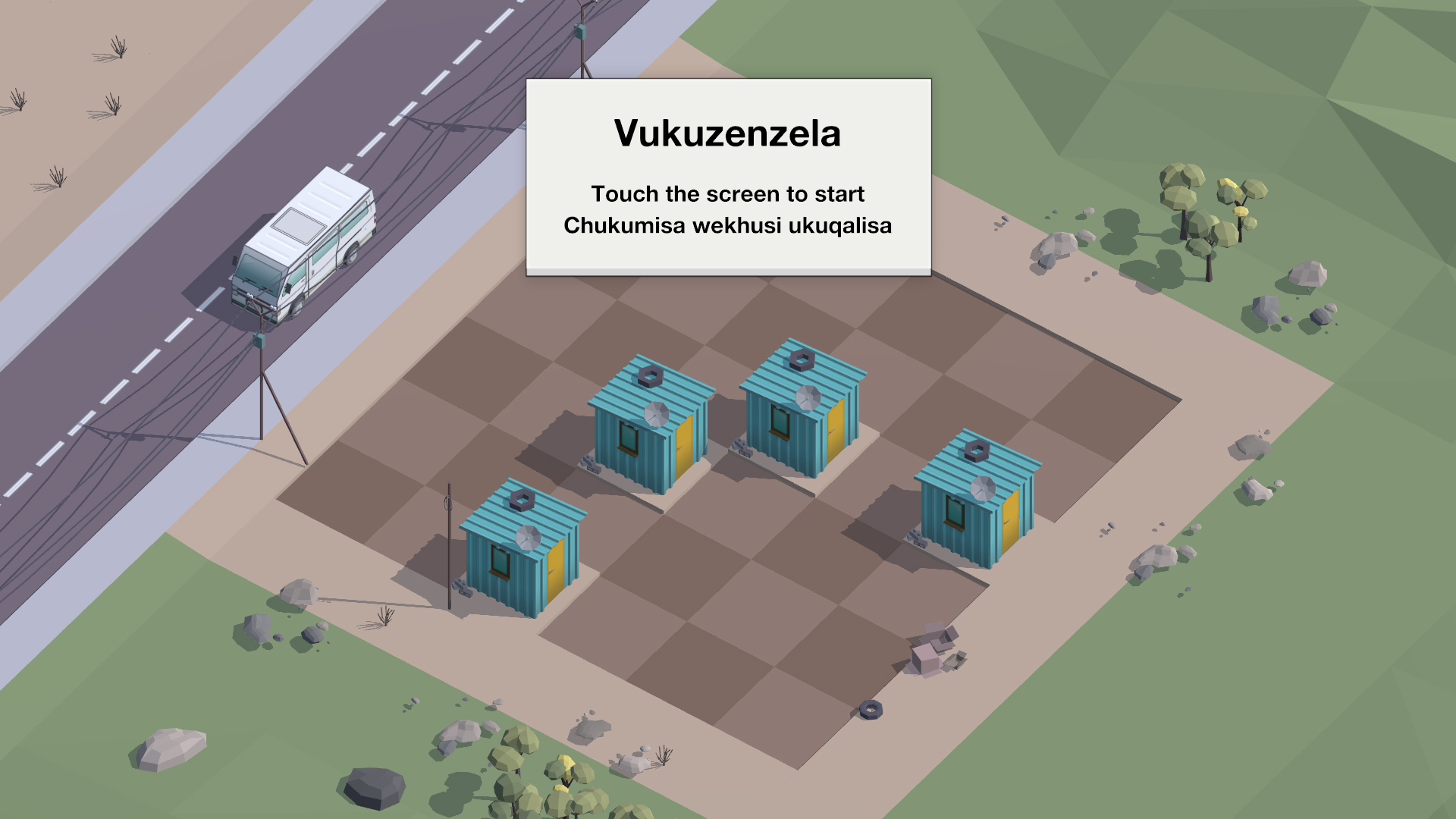
The idea behind the game is that we introduce players in informal settlements to the concept of reblocking, and help them to understand the benefits through play. It is designed as a puzzle game with levels that scale in complexity as we introduce new rules to the player. The goal for each level is to ensure that all of the houses are happy. Some houses want to be together, some don't want to be close to taxi ranks, and shebeens and daycare centres need to be separated. As the concept of reblocking is all about the community - and requires community buy-in in order to be effective - we really stressed the importance of group play from the outset. The initial design centred around individuals playing as a team, each one choosing a different character with varying traits (for example a house could only be moved by a builder) but we quickly found that approach was problematic to users who are not comfortable with games in general. Through a lot of refinement and honing what the core of the game is, we ended up with a game that can be played by individuals, groups of up to 4 playing as different characters, or much larger groups playing as a collective and making joint decisions. This was shown clearly during our playtest sessions with people from informal settlements with low literacy levels and little to no computer experience.
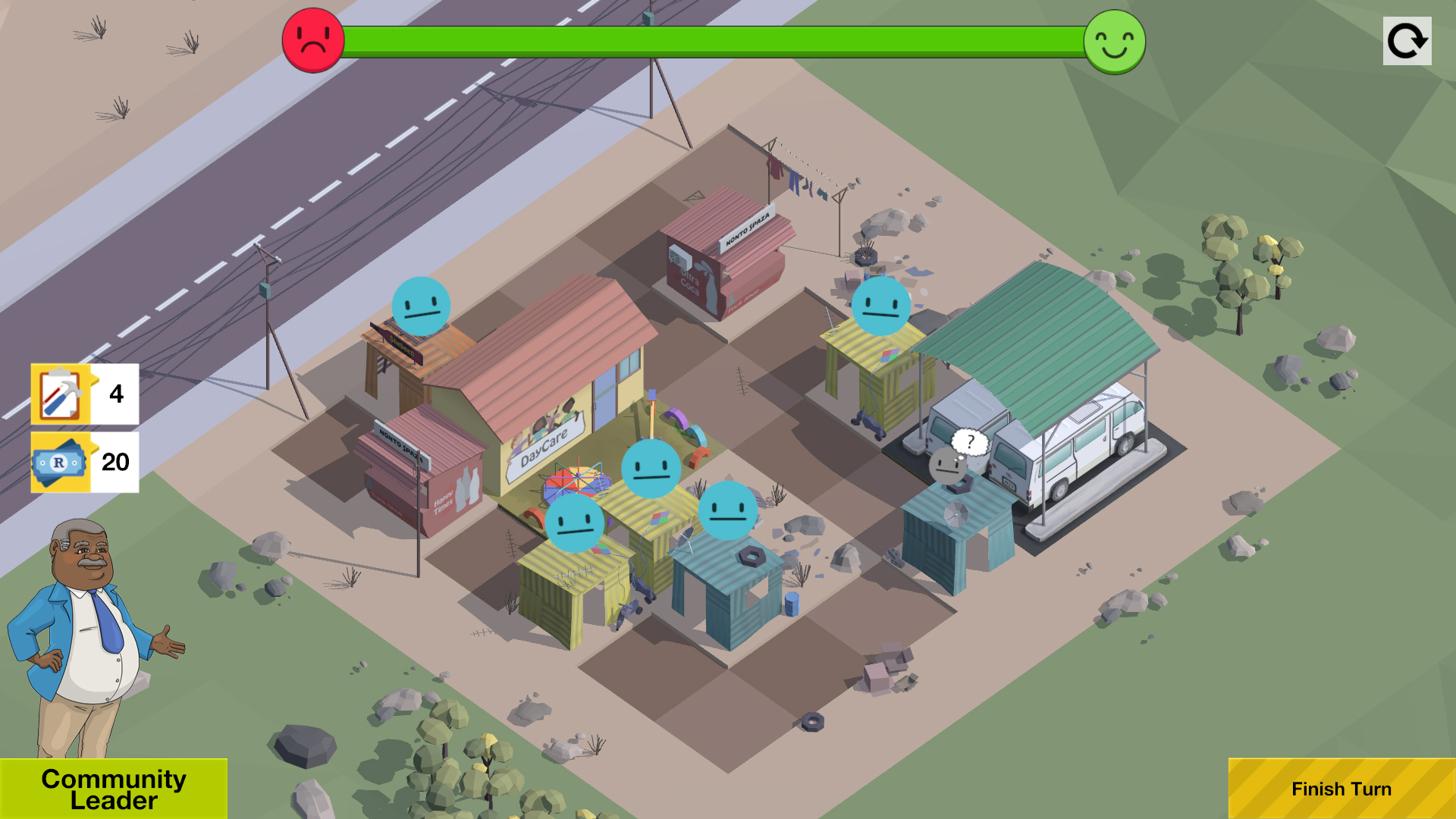
One of the key takeaways from a government point of view, is the gathering of data that they can use to serve the communities better. Here we have two methods: firstly through casual conversations with the NPCs we can learn about peoplke general socio-economic status without them having to fill in a form. Secondly, we will be adding an enumeration tool so that users can add their own census data in their areas using the same mechanics they will have been exposed to in the game.
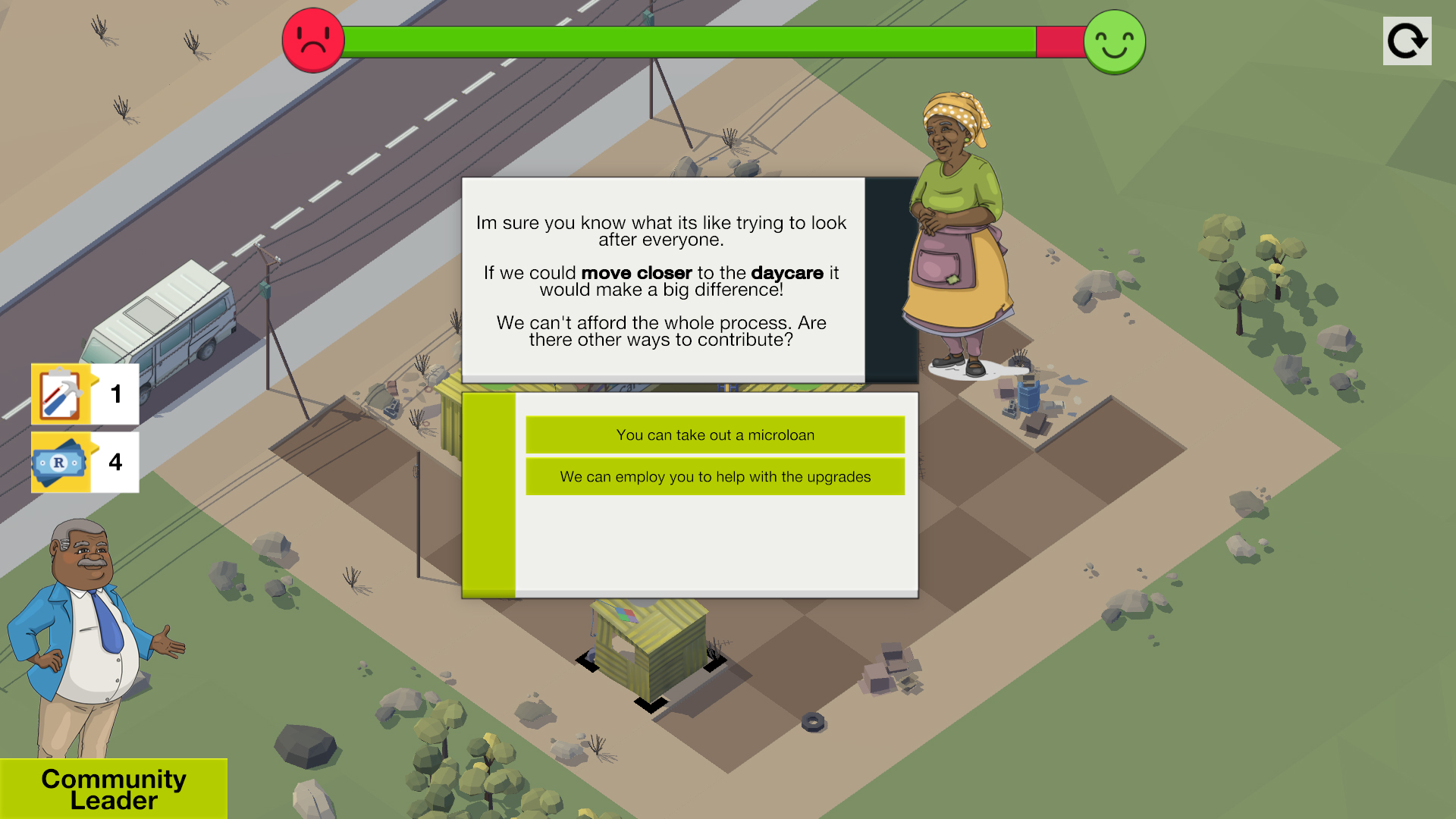
The initial rollout will be to community centres where a facilitator will be on hand to gather more information from players. It will be housed in an affordable kiosk with a large touch-screen, running off an Android board. The large format is critical to getting groups to play together as they can all clearly see the game and provide input. Once that is running smoothly, a mobile version will also be released to the general public as a means to highlight the housing issue as well.
Obviously a massive thanks to all of the sponsors and the facilitators, without whom this would never have happened: Cape Innovation and Tech Initiative (CiTi), Cape Craft and Design Initiative (CCDI), 67Games, Interactive Entertainment SA (IEASA), and the Western Cape Department of Economic Development and Tourism.
In terms of individual contributions, the team at RenderHeads were all involved in some way:
@shanemarks did the bulk of the coding
@ross provided the dialog system
@jwho303 added UI, design and juice
@kelm did the art
@bestnickname, Muano and Ridho added various bits of intense internal feedback
@davidhecker (that's me!) I provided general production planning and got to do the radio and TV stuff
We also roped in a few outsiders to help out with specialist areas:
@sfischer illustrated the character portraits
Shani did some scriptwriting to give us much better words
@mexicanopiumdog provided some nifty sound effects
@wildcat added some cool level designs
Lastly, @mattbenic was our prototype feedback mentor and gave us a ton of extremely useful advice and points of contention that we really tried to take on board as much as we could. Having an experienced voice on the outside to tell you the truth is such a good thing to have had on a project like this.
We'll add more to this post as we continue to work on Vukuzenzele and head towards rollout.
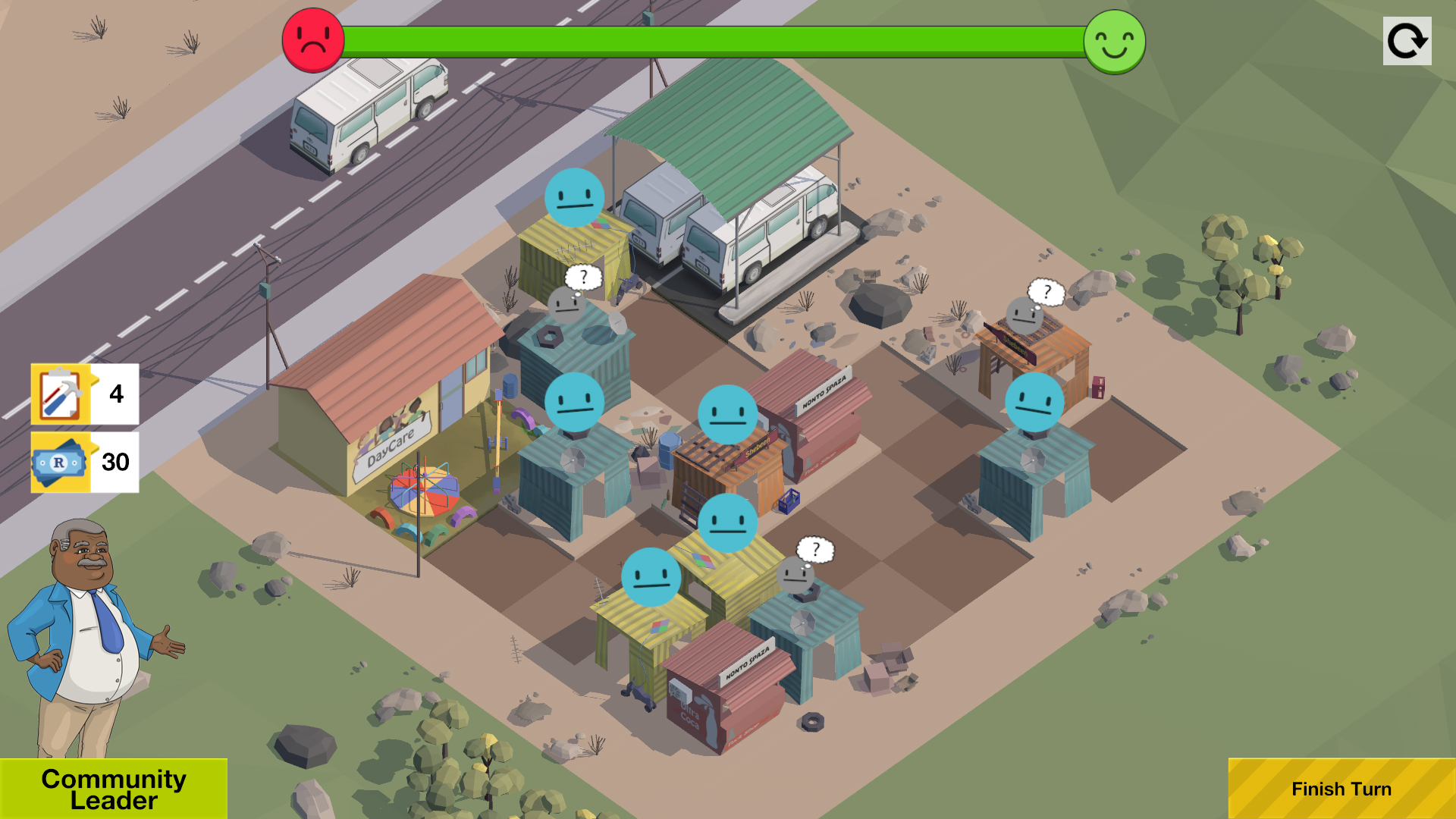
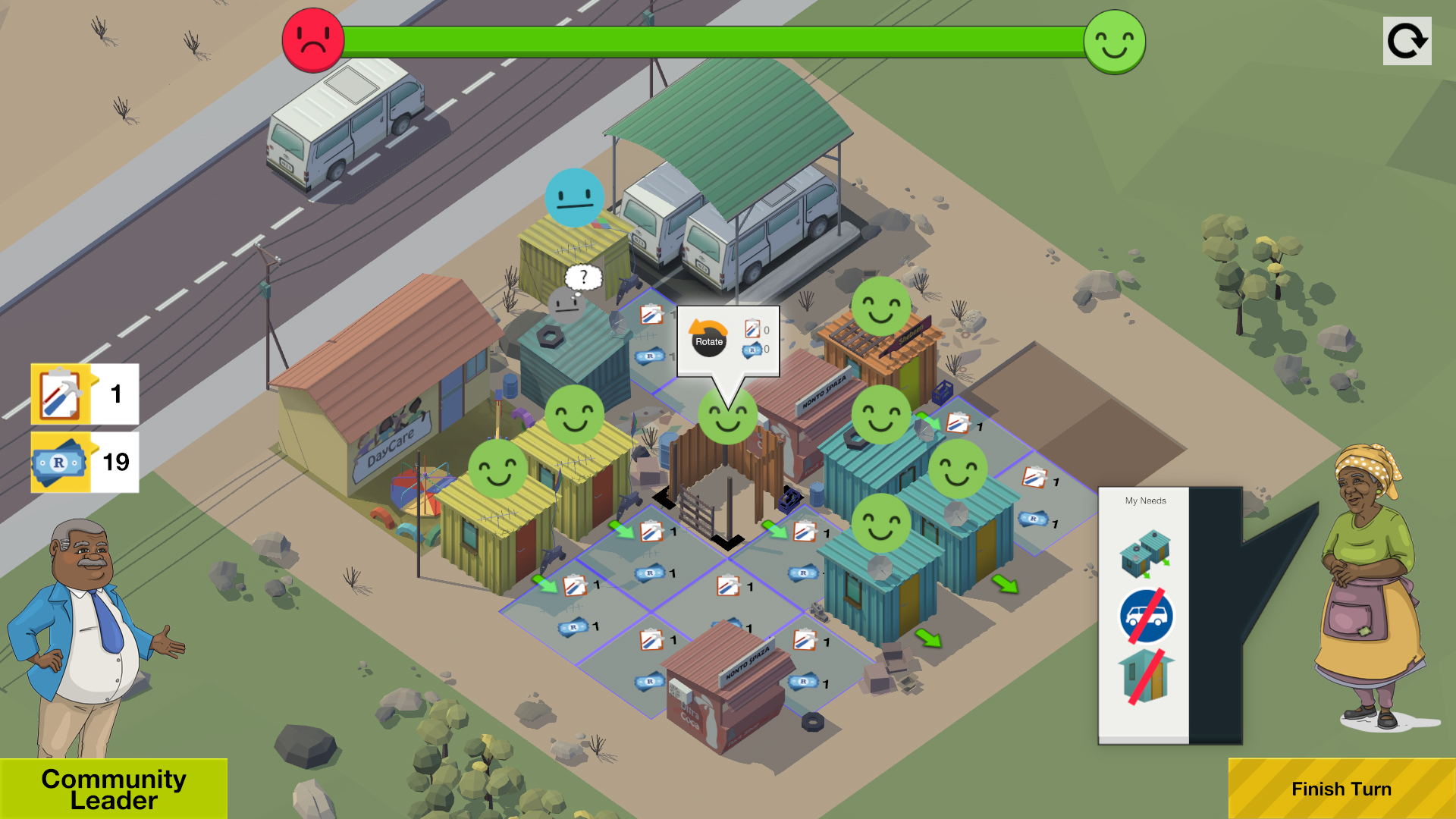
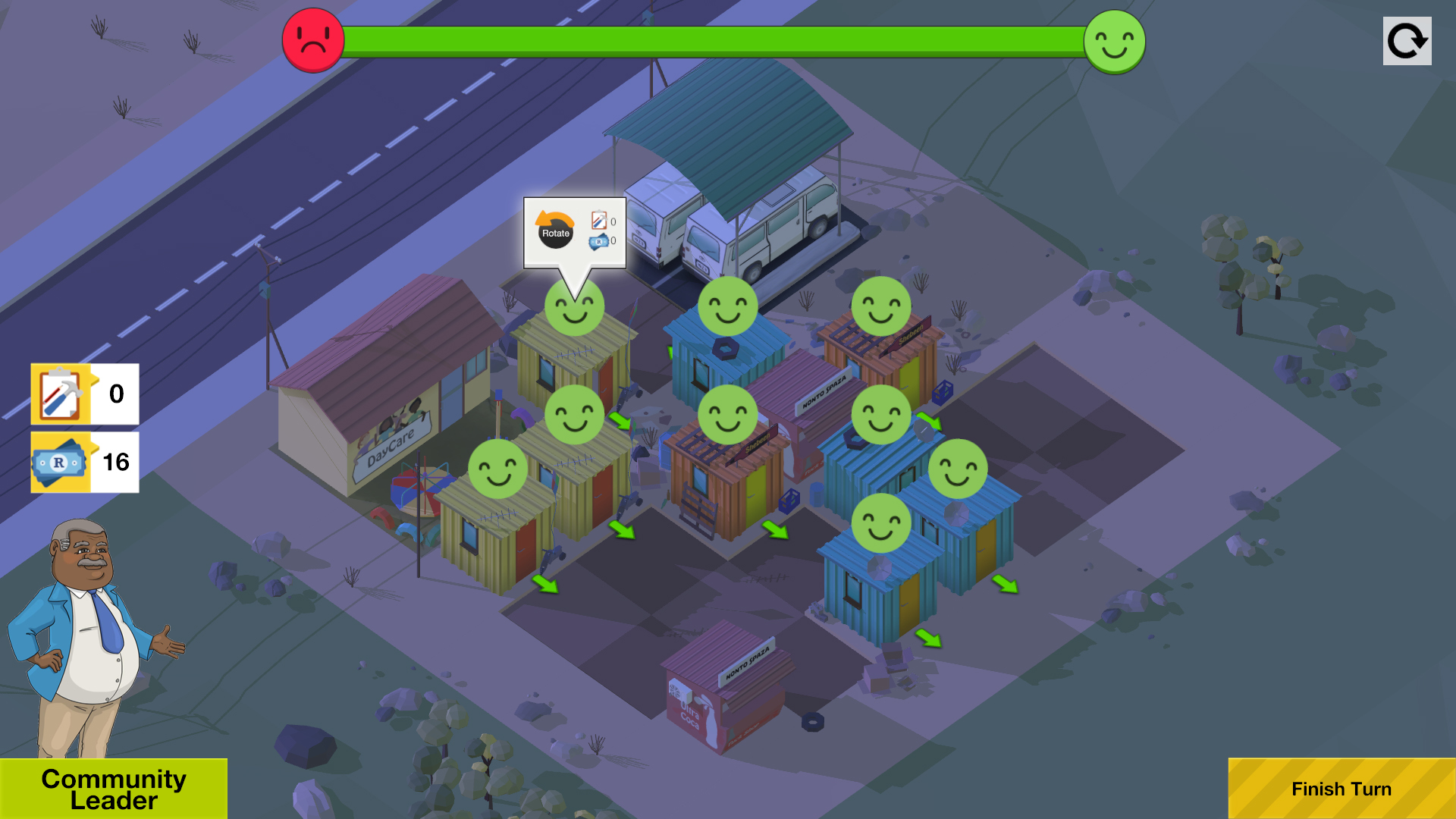
Vukuzenzele is the game we pitched to the Serious About Games competition in November 2016, and were awarded as the winners on 4 April. This project is a collaboration between RenderHeads (providing the game side of things) and iKhayalami, our NGO partners. iKhayalami is a leader in the area of reblocking, whereby they help communities to create better layouts and improved spatial arrangements in informal settlements, as well as providing upgraded structures that are water tight and fire retardant.

The idea behind the game is that we introduce players in informal settlements to the concept of reblocking, and help them to understand the benefits through play. It is designed as a puzzle game with levels that scale in complexity as we introduce new rules to the player. The goal for each level is to ensure that all of the houses are happy. Some houses want to be together, some don't want to be close to taxi ranks, and shebeens and daycare centres need to be separated. As the concept of reblocking is all about the community - and requires community buy-in in order to be effective - we really stressed the importance of group play from the outset. The initial design centred around individuals playing as a team, each one choosing a different character with varying traits (for example a house could only be moved by a builder) but we quickly found that approach was problematic to users who are not comfortable with games in general. Through a lot of refinement and honing what the core of the game is, we ended up with a game that can be played by individuals, groups of up to 4 playing as different characters, or much larger groups playing as a collective and making joint decisions. This was shown clearly during our playtest sessions with people from informal settlements with low literacy levels and little to no computer experience.

One of the key takeaways from a government point of view, is the gathering of data that they can use to serve the communities better. Here we have two methods: firstly through casual conversations with the NPCs we can learn about peoplke general socio-economic status without them having to fill in a form. Secondly, we will be adding an enumeration tool so that users can add their own census data in their areas using the same mechanics they will have been exposed to in the game.

The initial rollout will be to community centres where a facilitator will be on hand to gather more information from players. It will be housed in an affordable kiosk with a large touch-screen, running off an Android board. The large format is critical to getting groups to play together as they can all clearly see the game and provide input. Once that is running smoothly, a mobile version will also be released to the general public as a means to highlight the housing issue as well.
Obviously a massive thanks to all of the sponsors and the facilitators, without whom this would never have happened: Cape Innovation and Tech Initiative (CiTi), Cape Craft and Design Initiative (CCDI), 67Games, Interactive Entertainment SA (IEASA), and the Western Cape Department of Economic Development and Tourism.
In terms of individual contributions, the team at RenderHeads were all involved in some way:
@shanemarks did the bulk of the coding
@ross provided the dialog system
@jwho303 added UI, design and juice
@kelm did the art
@bestnickname, Muano and Ridho added various bits of intense internal feedback
@davidhecker (that's me!) I provided general production planning and got to do the radio and TV stuff
We also roped in a few outsiders to help out with specialist areas:
@sfischer illustrated the character portraits
Shani did some scriptwriting to give us much better words
@mexicanopiumdog provided some nifty sound effects
@wildcat added some cool level designs
Lastly, @mattbenic was our prototype feedback mentor and gave us a ton of extremely useful advice and points of contention that we really tried to take on board as much as we could. Having an experienced voice on the outside to tell you the truth is such a good thing to have had on a project like this.
We'll add more to this post as we continue to work on Vukuzenzele and head towards rollout.





Vukuzenzele_Screenshot_01.jpg
1920 x 1080 - 580K


Vukuzenzele_Screenshot_02.jpg
1920 x 1080 - 818K


Vukuzenzele_Screenshot_03.jpg
1920 x 1080 - 897K


Vukuzenzele_Screenshot_04.jpg
1920 x 1080 - 996K


Vukuzenzele_Screenshot_05.jpg
1920 x 1080 - 823K


Vukuzenzele_Screenshot_06.jpg
1920 x 1080 - 706K

Comments
So the general goal here is for it to help people understand re-blocking - but why does it matter if the general public understands re-blocking? Is there a plan to get this game into the hands of the high-up people that actually make these decisions (I guess that is a town planner)?
Assuming it does get played by the right people, can you expand a bit on how this would be more beneficial than just giving a town-planner a list of do's and don'ts on a piece of paper?
Thanks for the question!
The target market of the game isn't really for the general public to understand re-blocking, or for town planners to understand it either.
The key demographic are individuals that would be involved in a re-blocking process themselves. I.E people in an informal settlement that are in an area earmarked for re-blocking.
The core problem is that a re-blocking cannot take place until the community buys into the idea. This is because a) re-blocking is a community led initiative (ground up), and b) consensus between the various community leaders is required for a smooth rollout.
In general people in informal settlements are highly skeptical of anyone coming in (government or otherwise) telling them to move around. - whether it is beneficial or not.
It has been demonstrated that when people see re-blocking in action they rally around the idea and are generally for it
Therefore, the game aims to introduce the concepts and benefits around the re-blocking process through play (people are more open to ideas in a safe play space), and aims to facilitate this buy in.
Further to this, there is an additional learning outcome. We have a prototype of an enumeration tool (not show cased here) which allows people to capture their demographic information (which is required before a reblocking can take place). The interactions they learn in the game are the same they would need to know to use the enumeration tool.
That all being said, we will eventually open this up to the general public as a game to play, too - but only once we have validated it on the ground.
I hope this answers your question!
www.vukuzenzelegame.co.za
Nice work